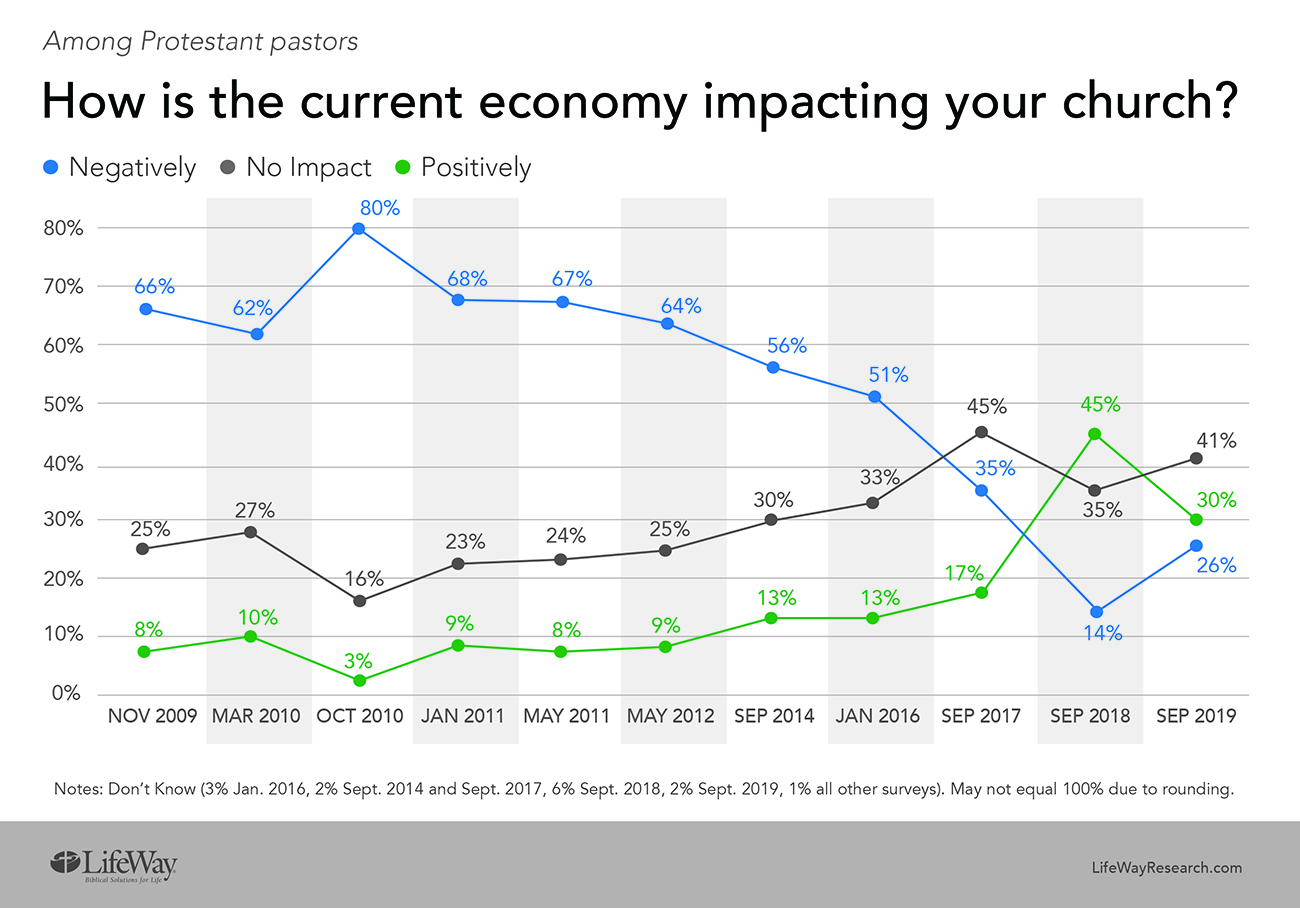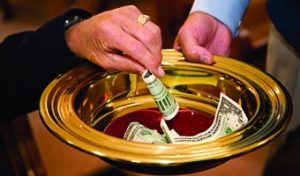NASHVILLE, Tenn.—As retail stores hope the holiday shopping season gives their bottom line a lift, American Protestant pastors are less sure the economy is helping their congregation this year.
Four of 10 pastors of Protestant churches in the United States (41 percent) say the economy is having no impact on their church, according to a new survey from LifeWay Research.
The rest are nearly split on whether the effect is positive (30 percent) or negative (26 percent).
“Fundamentally, the U.S. economy is in a similar place that it was a year ago,” said Scott McConnell, executive director of LifeWay Research. “Yet pastors are less optimistic about this outside influence on their church than they were in 2018.”
While the 30 percent of pastors who believe the economy is having a positive impact is more than triple what it was in the first part of this decade, it’s down sharply from the 45 percent who felt the same way in 2018.
Greater percentage of pastor feel negative impact
The percentage of pastors who feel a negative impact from the economy increased for the first time since 2010.
After falling in every survey from a high of 80 percent in October 2010, the percentage jumped from 14 percent in September 2018 to 26 percent this year.
African American pastors are most likely to say the economy is having a negative effect on their congregation (49 percent), while white pastors are most likely to see a positive impact for their church (33 percent).
Pastors of the smallest congregations, those with fewer than 50 in attendance, are most likely to say the economy is having a negative impact (37 percent) and least likely to say it’s having a positive one (17 percent).
Sign up for our weekly edition and get all our headlines in your inbox on Thursdays

Offerings up or stable
 Whatever the economic climate is outside the church, around three in four pastors say their offerings this year have been at or above last year’s.
Whatever the economic climate is outside the church, around three in four pastors say their offerings this year have been at or above last year’s.
More than a third (37 percent) say their church’s giving has been up so far this year. The same percentage say it has been the same as 2018.
One pastor in five (21 percent) says offering totals are below last year’s levels.
Those numbers are not as strong as in the 2018 LifeWay Research study when 42 percent of Protestant pastors said their offerings were above 2017, 37 percent said giving was the same, and 15 percent said it was below.
“Last year was the first year in which many Americans had lower withholding levels because of tax reform,” McConnell said. “It’s not surprising that fewer churches are seeing year-over-year growth in 2019 without a similar stimulus to their congregants’ take-home pay.”
Size matters
Larger churches are more likely to see increased giving from 2018. Half of churches with 250 or more in attendance (50 percent) say offerings are up this year. Forty-two percent of pastors of churches with attendance of 100 to 249 say the same.
A third of congregations with 50 to 99 in attendance (34 percent) have seen an increase in 2019, while only a quarter of churches with fewer than 50 (25 percent) have seen a similar uptick.
African American pastors are again the most likely to see a negative financial picture in their congregations. More than a third (36 percent) say their giving is below 2018, while 22 percent say the offering is above last year.
About half of all Protestant pastors (51 percent) say their total offerings in 2019 have been about what they budgeted, while 23 percent say they have been higher than budgeted and 23 percent say lower.
Last year, 48 percent said giving was similar to the budgeted amount, 29 percent said offering exceeded budget, and 19 percent said it was lower than budgeted.
Pastors say tax reform lacked impact
More than three in five pastors (64 percent) say they don’t think the 2018 tax reform had any effect on their church’s finances.
Similar numbers believe the changes negatively impacted their congregation (14 percent) as the pastors who say they’ve seen a positive impact (12 percent). Around one in 10 (11 percent) say they’re not sure.
When asked in 2018 as the reforms were being implemented, pastors were slightly more optimistic. Half (49 percent) said they didn’t expect any impact, but 26 percent thought they would see a positive effect on their church’s finances.
This year, pastors of larger churches, those with attendance of 250 and more, are more likely to say the tax reform has positively impacted their congregation (20 percent) than pastors of churches with 50 to 99 in attendance (10 percent) and those with fewer than 50 (7 percent).
“There are no signs the 2018 tax reform created continued income growth for churches,” noted McConnell.
The phone survey of 1,000 Protestant pastors was conducted from Aug. 30 to Sept. 24, 2019. The calling list was a stratified random sample drawn from a list of all Protestant churches. Analysts used quotas for church size.
Each interview was conducted with the senior pastor, minister or priest of the church called. Researchers weighted responses by region to reflect the population more accurately. The completed sample is 1,000 surveys, providing 95 percent confidence that the sampling error does not exceed plus or minus 3.2 percent. Margins of error are higher in sub-groups
Comparisons also were made to telephone surveys in previous years using the same methodology.
















We seek to connect God’s story and God’s people around the world. To learn more about God’s story, click here.
Send comments and feedback to Eric Black, our editor. For comments to be published, please specify “letter to the editor.” Maximum length for publication is 300 words.